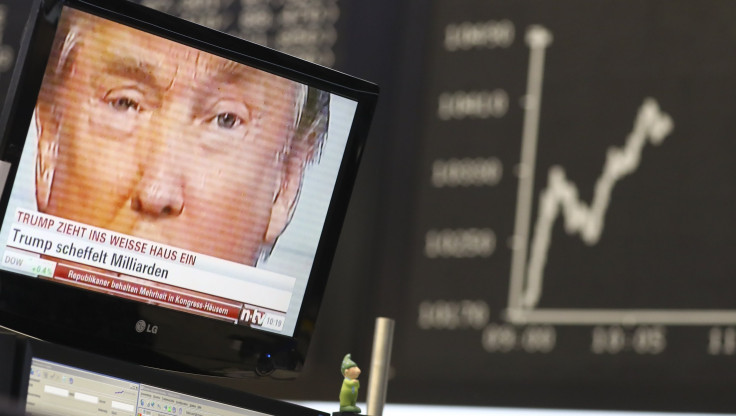How Powerful Is Donald Trump? His Tweets Change The World Economy

President-elect Donald Trump slammed pharmaceutical companies during his highly-anticipated press conference Wednesday, sending shares in companies such as the Netherland's Nordiq tumbling by as much as five percent, the latest display of the billionaire business tycoon-turned-politicians' unprecedented effect on the market.
Previous leaders have always held significant clout over the economy, for better or for worse. Former President Richard Nixon's 1971 decision to set price controls in response to inflation took the economy nearly a decade to recover from, while President Barack Obama's post-financial crisis policies are often credited with boosting an ailing economy to record highs. Trump's off-the-cuff, unpredictable style, however, is a vast departure from past presidential practices. Rather than prepping companies and traders with press conferences, the president-elect often fires at random, catching the markets off guard and affecting major market decisions.
When Trump criticized Japanese automaker Toyota last week for manufacturing in Mexico instead of the U.S., shares in the company fell 3 percent, amounting to a $1.2 billion loss. The incident reportedly prompted Toyota President Akio Toyoda to meet Vice President-elect Mike Pence in Washington to smooth relations between the company and the incoming administration. The same week, the president-elect threatened the world's two largest automakers, Toyota and General Motors, with a "big border tax," another major car company, Ford, canceled plans to build a $1.6 billion plant in Mexico and instead announced it would invest $600 million in its domestic plant in Michigan, stating there was a "more positive manufacturing environment" ahead of Trump's presidency.
Trump's market influence has prompted investors to closely monitor his statements in the press and on social media. Richard Dukas, chairman and CEO of Dukas Linden Public Relations, told International Business times via email that while large institutional investors usually have comprehensive long-term strategies based on global economic events, some investors had begun "trading on Tweets."
"The president elect's use of social media and unfiltered style are unprecedented. We’ve seen significant market reactions to some of his comments, such as the decline in pharma stocks after his comments about drug makers," Dukas said. "Many of our clients, including large asset managers, are still grappling with how to view this new type of market-moving information, not to mention the new administration’s possible tax, trade and regulatory policies."
One entrepreneur and former trader, Rachel Mayer, who co-founded the application Trigger dedicated to tracking the impact of certain events on brokerage accounts, told International Business Times that Trump's leverage on the market was unmatched. She likened Trump's Twitter influence to that of a "South American dictator," saying her 20,000-plus clients carefully anticipated how Trump's next move could affect their investments.
"This type of activity is usually associated with an earnings announcement, not 140 characters," Mayer said, referring to Toyota's decline in the wake of Trump's comments.
Mayer said she launched a data set specifically for Trump last Tuesday and in the past few days it has become the most popular "Trigger" on the app. She expects this influence to last throughout Trump's presidency, which begins Jan. 20.
© Copyright IBTimes 2024. All rights reserved.






















